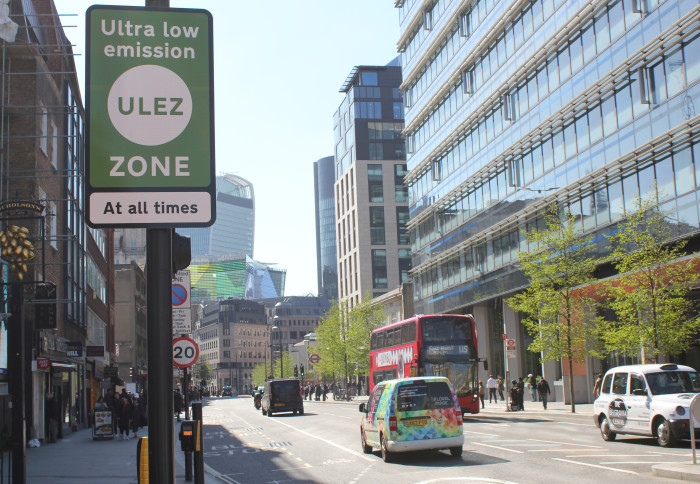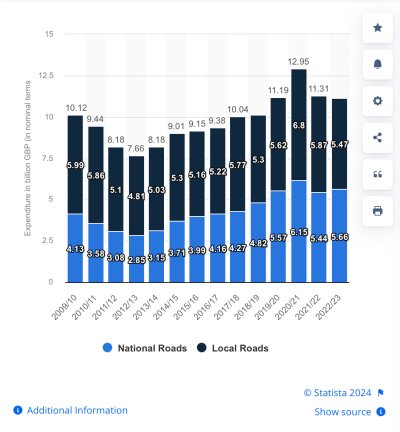- Joined
- Jul 1, 2010
- Messages
- 4,823
- Car
- W209
Doshing out fines for people who spell his name wrong
Sorry couldn't resist it
Sorry couldn't resist it
Follow along with the video below to see how to install our site as a web app on your home screen.
Note: This feature may not be available in some browsers.
He’s that desperate so don’t knock the idea.Doshing out fines for people who spell his name wrong
Sorry couldn't resist it
You may well be right. Citizen Khan is certainly following the advice of the C40 Clan as per this sectionSeems the ULEZ charge will be the least of your worries in Khan's Kingdom:

Sadiq Khan's £150m Pay-Per-Mile Road Charging Scheme is Straight Out of the C40 Cities Playbook That Sets London Target of ZERO Private Vehicles by 2030 – The Daily Sceptic
Don't be surprised Sadiq Khan is spending £150 million developing pay-per-mile road charging for London. It's all part of the C40 Cities plan, which states the ambitious target of zero private vehicle ownership by 2030.dailysceptic.org
So basically he knows that Londoners love their vehicles because they’re convenient, safe and reliable despite the traffic. Armed with this information he will not improve buses, the roads, or the underground but he will shaft you where it hurts.You may well be right. Citizen Khan is certainly following the advice of the C40 Clan as per this section
- Integrate the relevant top pollution-reducing actions that are within our city and under our control into city Climate Action Plans. For example, by rapidly expanding zero emission public transport; creating low or zero emission areas; supporting walking/cycling; implementing vehicle restrictions or financial incentives/disincentives, such as road-use or parking charges; reducing truck, non-road machinery and city-owned vehicle emissions; cleaning up construction sites and equipment; reducing industrial emissions; reducing emissions from wood burning; expanding affordable access to clean energy for cooking and heating; restricting pollution from solid waste burning; and expanding greening.
So basically he knows that Londoners love their vehicles because they’re convenient, safe and reliable despite the traffic. Armed with this information he will not improve buses, the roads, or the underground but he will shaft you where it hurts.
He is happy for you to ride in a polluting taxi yet he penalises other polluting vehicles and then he stands by while the suppliers of public transport hold the commuters to ransom by going on strike.
You couldn’t make it up.
And those polluting vehicles choking everyone with their CO2 are immediately rendered safe by the payment of £12.50. It's a miracle, I tell you.
Follow the science.
Except that it doesn’t reduce pollution, at best it simply transfers it to the edge of the zone, while providing local government with a tax income from non-residents who are therefore not voters and some extra public transport revenue which still isn’t enough to cover the cost of buses and trains which spend most of their time running empty.The £12.50 ULEZ charge is meant to be significant enough to discourage owners of older Diesel cars from driving them inside the Zone. If the ULEZ charge isn't a significant enough cost to constitute a deterrent, as your post appears to be suggesting, then why are people up-in-arms about it? Well, that answer is that they are upset because it IS a deterrent and it does stop them from driving their old Diesel cars into the Zone. Hence it works as intended by reduces NOx pollution.


Why aren’t the dirty polluting vehicles just banned completely?The £12.50 ULEZ charge is meant to be significant enough to discourage owners of older Diesel cars from driving them inside the Zone. If the ULEZ charge isn't a significant enough cost to constitute a deterrent, as your post appears to be suggesting, then why are people up-in-arms about it? Well, that answer is that they are upset because it IS a deterrent and it does stop them from driving their old Diesel cars into the Zone. Hence it works as intended by reduces NOx pollution.
Khan knows there will always be a certain amount of drivers more than willing to pay the £12.50.The £12.50 ULEZ charge is meant to be significant enough to discourage owners of older Diesel cars from driving them inside the Zone. If the ULEZ charge isn't a significant enough cost to constitute a deterrent, as your post appears to be suggesting, then why are people up-in-arms about it? Well, that answer is that they are upset because it IS a deterrent and it does stop them from driving their old Diesel cars into the Zone. Hence it works as intended by reduces NOx pollution.
Would forcing cars off the road be a net loss in revenue? Less cars means less damage to the roads, so lower maintenance costs.You could argue that tax on fuel is already a pay-per-mile strategy.
So, when the public are forced off the road, who is going to pay the lost revenue?
But is £11 Billion spent every year??Would forcing cars off the road be a net loss in revenue? Less cars means less damage to the roads, so lower maintenance costs.
£11 billion was spent on the UK’s roads in 2022/23. During the same period, VED raised £7 billion. (Of course that income doesn’t include the £25 billion from fuel duty.)
Would forcing cars off the road be a net loss in revenue? Less cars means less damage to the roads, so lower maintenance costs.
£11 billion was spent on the UK’s roads in 2022/23. During the same period, VED raised £7 billion. (Of course that income doesn’t include the £25 billion from fuel duty.)
Let’s not forget that the point of ULEZ is to reduce pollution in a concentrated area for the benefit of those people who live and/or work in London. Those people who previously would have driven their non-compliant vehicles into London aren’t now instead going to be driving round and round the Chilterns to do the same mileage.Except that it [ULEZ] doesn’t reduce pollution, at best it simply transfers it to the edge of the zone …
Not every year. It was up to £13 billion not long ago.But is £11 Billion spent every year??


Which report should we believe?Not every year. It was up to £13 billion not long ago.
View attachment 153094

UK road spending 2024 | Statista
Public sector spending on roads in the United Kingdom was over 12.17 billion British pounds in 2023/24, a slight decrease when compared with the previous year.www.statista.com
Official statistics or the media? I tend to prefer the former, but both are often selective with the data to support their agenda.Which report should we believe?
Doesn’t that argument miss the economic benefit of the car journey itself?Would forcing cars off the road be a net loss in revenue? Less cars means less damage to the roads, so lower maintenance costs.
We use essential cookies to make this site work, and optional cookies to enhance your experience.
